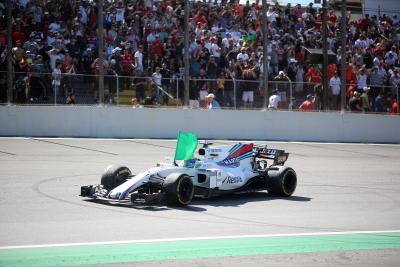How F1’s Vietnamese dream reveals Brazil’s emerging nightmare
Three or four years ago, if you’d told me the future of the Brazilian Grand Prix was under threat, I would have been more than a little upset.
Sure, the race had its problems - I was behind Jenson Button in traffic during that 2010 attack which made quite an introduction to the country - but there was a certain shambolic charm to the dilapidated facilities, and who can argue with the track itself?
Three or four years ago, if you’d told me the future of the Brazilian Grand Prix was under threat, I would have been more than a little upset.
Sure, the race had its problems - I was behind Jenson Button in traffic during that 2010 attack which made quite an introduction to the country - but there was a certain shambolic charm to the dilapidated facilities, and who can argue with the track itself?
But since then the security problems have got worse. I got sick of waiting in the dark for taxis, standing in the middle of a favela holding a laptop bag, feeling like a neon target. When the circuit moved the press room from its birdseye view of the track, with 360 degree views (the space was given over to the Paddock Club following the paddock refurbishment), and put the press in an underground bunker halfway down the hill to the car park, I quit Brazil.
And now it looks as though Formula 1 will be doing the same with the 2019 edition of the race the last under the current contract and no sign of a new deal on the cards.
There has been talk of moving the race to a facility currently under construction in Rio de Janeiro, also rumoured to be looking to attract MotoGP back to the country, but in recent years Rio has been an even more fraught city than Sao Paulo, with rival gangs escalating violence.
A forthcoming change in leadership – the hardline right-winger Jair Bolsonaro was elected in October, and will assume office on 1 January – could see a crackdown on gang activity in the city, but as things stand Rio is no safer an option for a grand prix than Sao Paulo.
Not only is the race in trouble, but so too is Brazilian involvement in the sport which could have even more worrying ramifications for F1 in a country stepped in glorious history and idols.
Sergio Sette Camara (the gloriously nicknamed ‘seven bedrooms’) may have boosted hopes with a McLaren reserve driver announcement, along with yesterday’s news from Haas signing Pietro Fittipaldi (grandson of two-time F1 world champion Emerson) as a 2019 test driver, but neither will be a full-time race driver and nor likely to become one in the near future.
The 2019 season will be the second in a row without a Brazilian racer on the grid, when at least one Brazilian had been a constant presence since 1970.
Nor is there a clear superstar on the way up. Newboys Sette Camara at McLaren and Fittipaldi at Haas plus fellow Piquet offspring are working their ways up through the ranks, but none are knocking on the door of F1 just yet.
While the loss of Interlagos will surely be felt – the track has been home to a host of good races, not least those held in the wet – the F1 calendar is continuing to expand, and this week it was confirmed that a Hanoi street race would be added to the roster in 2020.
The Vietnamese Grand Prix will mark the first new addition to the calendar under the new F1 ownership, although the road to this race was first paved in the Ecclestone era, when Heineken was brought into the fold as a sponsor of the sport.
Vietnam is a key market for Heineken, one of the fastest growing in Asia, and when Gianluca di Tondo announced the F1 partnership in Montreal in 2016 he named a Vietnamese Grand Prix as a dream race.
While the initial discussions were held by the Ecclestone regime, the Vietnamese Grand Prix ticks all of the boxes on F1’s calendar wish list: a street race in a destination city, in a country both appealing to tourists and amenable to calendar clustering, and has the capacity to become a Superbowl-scale event with private financing and sponsor support.
No wonder those at Liberty Media were eager to push this race through as its first new event.
A heartening element of the generic press release announcing the Vietnamese race came thanks to Nguyen Viet Quang, Vice Chairman and CEO of race promoter Vingroup, who said, “an essential part of this collaboration has been making sure that we not only showcase the city of Hanoi but also deliver an exciting race for Formula 1 fans in Vietnam and around the world.”
Showcasing the city is exactly what new races should be aiming for (as well as providing good racing, although that should go without saying). Highlighting local culture is what makes the Mexican Grand Prix such a special event, and if the Vietnamese race promoters are going to take a leaf out of that book and provide us with an event that is unmistakably Vietnamese in flavour, then they are already off to a very good start. Where that leaves the Brazilian event remains unclear.










